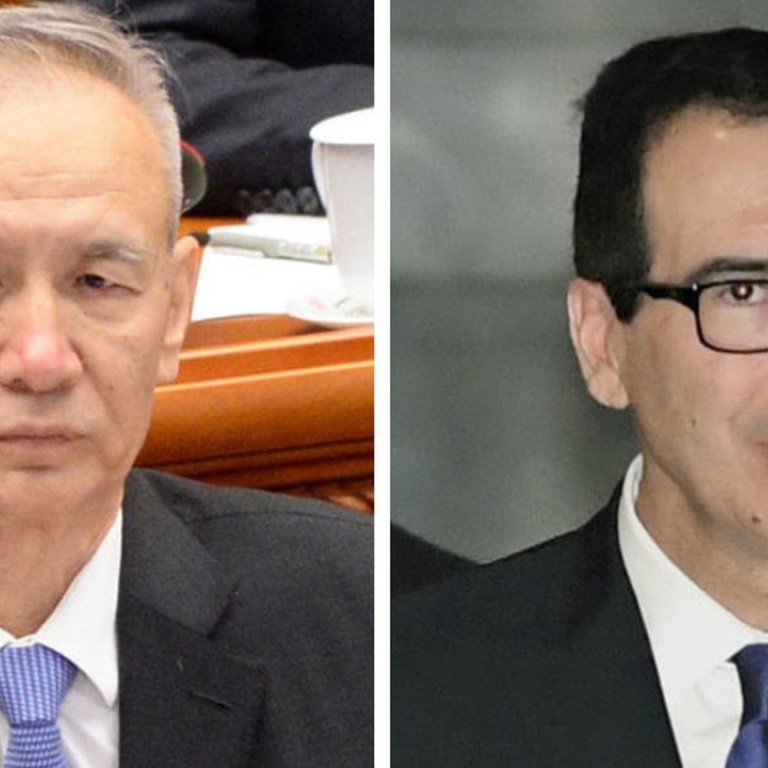
Exclusive | China’s top trade negotiator Liu He heads to US in bid to kick start new talks on easing tensions
- Vice-Premier had cancelled plan to visit Washington in September, but planned Xi-Trump meeting has improved chances of making progress
- Chinese sources say the atmosphere is better now, but warn US president’s volatility gives reason to be cautious
China’s top economic negotiator is expected to visit the United States soon for talks with his American counterparts aimed at calming trade tensions between the two sides and paving the way for a meeting between the two countries’ presidents.
In total three sources, from both sides, confirmed the development to the South China Morning Post, but said the schedule for Vice-Premier Liu He’s trip had still not been decided.
Liu had cancelled a trip to the United States in September amid rising tensions between the two nations.
But a phone conversation between Chinese President Xi Jinping and his US counterpart Donald Trump at the start of the month - during which they agreed to meet on the sidelines of the G20 summit in Argentina at the end of the month, has injected positive momentum for Liu’s visit to Washington.
Have trade talks begun? John Bolton meets top Chinese diplomat
“The atmosphere for both sides to conduct talks is much better now,” a source from a Chinese government think-tank said.
The source said there might be a good chance of progress, but warned that Trump’s unpredictability should be noted despite optimism on the Chinese side.
He said a consensus had been reached between the two countries during Liu’s trip to the US in May, but then Trump decided to slap more tariffs on China, triggering tit-for-tat retaliation.
The tensions between China and the US have spilled over into security aspects over the past weeks, with both Trump and Vice-President Mike Pence accusing China of meddling in US domestic politics.
Pence’s speech – in which he attacked Chinese policy on a number of fronts, including the South China Sea, trade and human rights – has intensified concerns that a new cold war was emerging.
But the source said that instead of a permanent shift of US policy, the speech was seen as a typical example of Trump’s approach to negotiations.
Officials and diplomatic observers have warned that the global economy and security would be affected if the China-US tensions drag on, and it was crucial for both nations to lay out their bottom line.
At a business forum in Singapore on Tuesday, Chinese Premier Li Keqiang said China and the US should be cooperative partners.
He said China hoped the two sides could find an arrangement that was acceptable to both sides based on the principle of mutual respect. “There is no winner in a trade war,” Li said.
‘Mutual respect’ key to ending trade war, Liu tells Kissinger
Assistant commerce minister Li Chenggang said on Tuesday that both sides were in close contact to follow up on the phone conversation between Xi and Trump.
In Beijing on Saturday, Liu told former US secretary of state Henry Kissinger that China and the US should seek to resolve their economic disputes on the principles of “mutual respect, equality and mutual benefit”.
Observers said Beijing was hoping that the visit by Kissinger, who brokered the landmark US-China summit between Richard Nixon and Mao Zedong in 1972, would help pave the way to successful talks between Xi and Trump.
Liu’s planned trip follows a telephone conversation on Friday between Liu and US Treasury Secretary Steven Mnuchin which failed to deliver any breakthrough, according to The Wall Street Journal.
The report said some US officials believed China would make an offer before the G20, but added that Chinese officials were concerned that a formal offer would cost them leverage.
Reassuring message for China economy despite challenges
Some kind of ceasefire could yet be possible, according to the report, with the US refraining from increasing tariffs, as it has threatened to do, from January 1.
China and the US have been locked in an escalating trade war since July, slapping tariffs on each other’s imports, while negotiations to end the deadlock have stalled.
China blames the tariffs on the broader US strategy to contain it, while the US has accused China of using unfair trade practices for its benefit.
Shi Yinhong, professor of international relations with Beijing’s Renmin University, said the best guess was that there would be no further tariffs from China and the US on each other's products.
“But the other half of the trade war, which is the US technology blockade, will not be suspended, no matter who is the US leader,” he said.
In a speech on Monday, Shi said the Chinese government should expand market access, increase imports from the US, and reduce hefty state subsidies and control of economic activities to strive for a “relatively long period or regional” truce in the trade war.
But he added that China was unlikely to fundamentally change its industrial policy.
Shi said China’s top priority now was to curtail the risks of the trade war on its economy and financial system to ensure stability.
Shi recommended that for the next five to six years China should take great leaps to adjust trade policy and deepen reform without endangering its economy.
Chen Long, an economist with Gavekal Dragonomics, said China may ask the US to impose no further tariffs when both countries resume talks, but it could take a pragmatic approach .
“The best outcome is to stop tariffs rising from the current level. But it is difficult to reverse the previous tariffs.” he said.
“But the US won’t stop its technological blockade on China while there is not much for Beijing can do to overhaul policies on industry and state-owned enterprises to meet demands of Washington.”
Additional reporting by Catherine Wong



